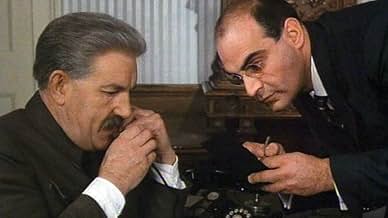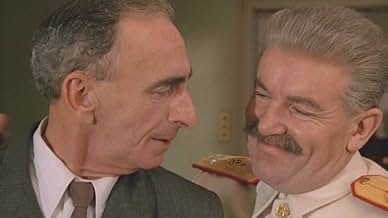Aggiungi una trama nella tua linguaAbout Stalin's inner circle who he starts seeing as untrustworthy.About Stalin's inner circle who he starts seeing as untrustworthy.About Stalin's inner circle who he starts seeing as untrustworthy.
Foto
George A. Cooper
- Kaganovitch
- (as George A Cooper)
Trama
Lo sapevi?
- QuizColin Blakely, David Suchet, David Kelly and Jean Heywood all speak with distinct Irish accents to emphasize that the characters they play are Georgian, something that distinguished Stalin and Beria from other members of the Politburo.
- ConnessioniFeatures Sfida infernale (1946)
- Colonne sonoreV put'
aka "Soldatskaya pesnya"
Music by Vasiliy Solovev-Sedoy
Lyrics by Mikhail Dudin
Performed by [suhh], Estradnyy Orkestr Leningradskogo Radio
Recensione in evidenza
Search the Internet for comments on this film and you might find it described as a failed Mel Brooks comedy that trivializes the suffering of millions. It isn't. If you want to see it as a black comedy then the director (Jack Gold) leaves that mostly up to you. The blackness is suppled not by him but by the closeness of the action to real events. This is not fiction, and it's not zany. These people really were like this and these things, or things very like them, happened. Some of the events shown are condensed from different incidents, it's true. Stalin's meeting with Mao is a caricature but one that captures the mutually suspicious, mutually uncomprehending mood of their real meetings. Stalin didn't literally die at Beria's hands although it's very likely that Beria had a hand in Stain's death. It's that probability that the film is depicting in condensed form. But it's not meant to be that kind of history. It's as a psychological study of the petty, frightened, sadistic murderers who held the lives of the people of the USSR in their hands towards the end of Stalin's life that the film works and deserves to be called a masterpiece. The whole cast is good but by Colin Blakely , David Kelly, and David Suchet stand out. Blakely plays the increasingly physically and mentally sick Stalin, paranoid, typically referring to himself in the third person as the real Stalin did, as though his crimes should be blamed on somebody else. The dying Stalin is obsessed with what he sees as the lethal significance of trivia (the basketball result, his guard's night shoes). Blakely makes it obvious that Stalin is as deeply afraid and insecure as anyone around him: when not actually signing death warrants he humiliates, crushes any surviving decency and self-respect that people around him have left. The old murderer enjoys doing it, but it's also the only way he knows to survive, physically and emotionally. David Kelly as Sergo gives a haunting performance as a man rehabilitated from 13 years in a labor camp, only to be condemned to something worse - a comfortable life in which the faith that sustained him before has now been destroyed by its own object. Suchet is brilliant as the rapist Beria, whining and cringing to The Boss and slimily, murderously self-assured towards everybody else. A clever touch is the use of British and Irish regional accents to reflect variations in regional accents of the USSR. The Georgians are all Irish and Stalin himself is very audibly from the north of that country. Molotov (Nigel Stock) is Welsh, Mikoyan (Freddie Earlle) apparently a native of Glasgow, Kruschev (Brian Glover) from the north of England. No student of the psychology of despotism should miss this film. (The march on which the films opens, incidentally, is 'Let's Go' by V. Soloviev-Sedoi, lyrics by M. Dudin Singer, originally written for the 1954/5 Soviet film 'Maxim Perepelitsa').
I più visti
Accedi per valutare e creare un elenco di titoli salvati per ottenere consigli personalizzati
Dettagli
Contribuisci a questa pagina
Suggerisci una modifica o aggiungi i contenuti mancanti

Divario superiore
By what name was Red Monarch (1983) officially released in Canada in English?
Rispondi





























